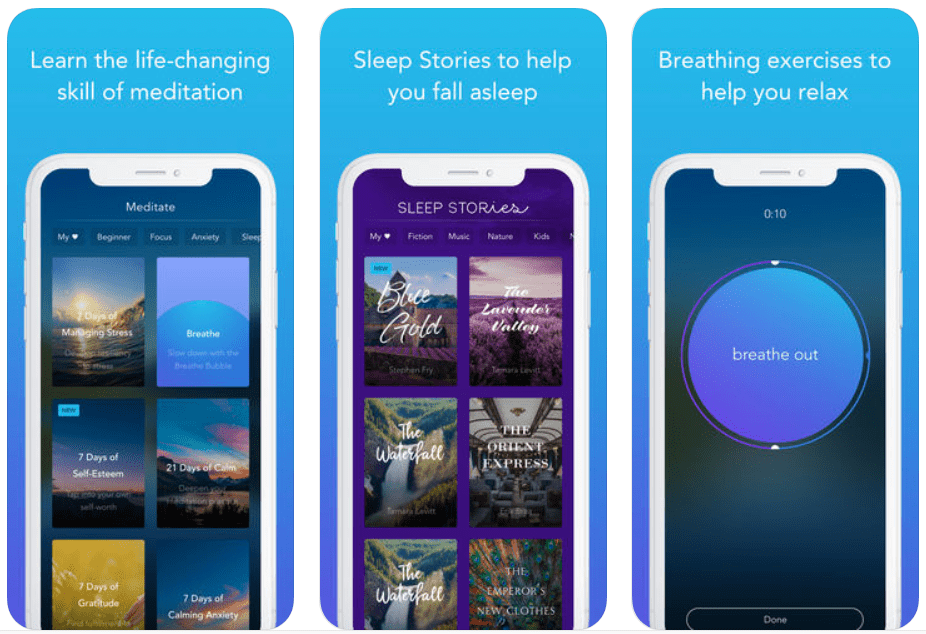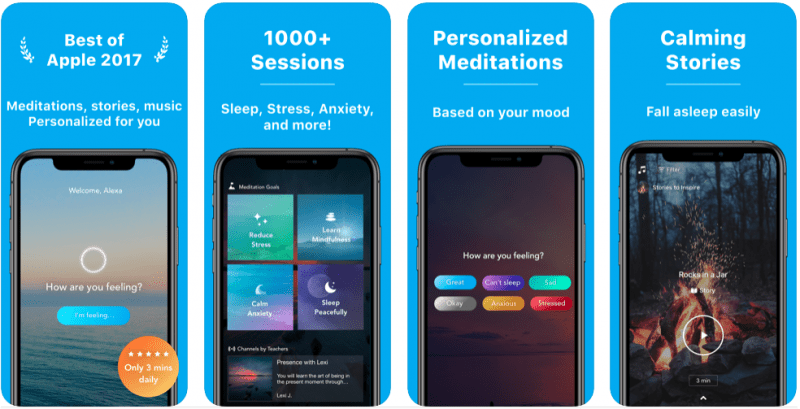Anxiety relief apps have emerged as a powerful tool in the fight against anxiety, offering a convenient and accessible way to manage symptoms. These apps provide a range of features, from guided meditations to cognitive behavioral therapy techniques, empowering users to take control of their anxiety and improve their overall well-being.
Overview of Anxiety Relief Apps
Anxiety relief apps are designed to help individuals manage and reduce their anxiety symptoms. These apps typically offer a range of features, including:
- Cognitive behavioral therapy (CBT) techniques
- Mindfulness exercises
- Breathing exercises
- Relaxation techniques
- Mood tracking
- Sleep tracking
Anxiety relief apps can be categorized into several types, including:
- CBT-based apps:These apps use CBT techniques to help users identify and change negative thought patterns and behaviors that contribute to anxiety.
- Mindfulness-based apps:These apps teach mindfulness techniques, which can help users focus on the present moment and reduce stress and anxiety.
- Relaxation-based apps:These apps provide relaxation techniques, such as deep breathing exercises and guided meditations, to help users reduce stress and anxiety.
- Sleep-tracking apps:These apps track sleep patterns and provide insights into how sleep quality affects anxiety levels.
Some popular anxiety relief apps include:
- Calm
- Headspace
- Mindfulness Coach
- CBT-i Coach
- Sleep Cycle
Benefits of Using Anxiety Relief Apps
Anxiety relief apps offer a range of benefits that make them an effective tool for managing anxiety symptoms. These apps provide convenient, accessible, and cost-effective support for individuals seeking relief from anxiety.
Convenience and Accessibility:Anxiety relief apps are readily available on smartphones and tablets, allowing users to access them anytime, anywhere. This eliminates the need for in-person therapy sessions, making it easier for individuals to fit anxiety management into their busy schedules.
Cost-Effectiveness
Compared to traditional therapy, anxiety relief apps are significantly more affordable. Many apps offer free or low-cost subscription plans, making them accessible to a wider range of individuals.
Effectiveness in Managing Anxiety Symptoms
Research has shown that anxiety relief apps can be effective in reducing symptoms of anxiety. A study published in the Journal of Medical Internet Research found that participants who used an anxiety relief app experienced significant improvements in anxiety symptoms, including reduced stress, worry, and panic attacks.
Features of Anxiety Relief Apps

Anxiety relief apps offer a range of features to help users manage their anxiety symptoms. These features can include:
- Guided meditations: Guided meditations are a form of mindfulness meditation that involves following a set of instructions to focus on the present moment and relax the body and mind.
- Breathing exercises: Breathing exercises are a simple but effective way to reduce anxiety and stress. Anxiety relief apps often include a variety of breathing exercises, such as deep breathing, paced breathing, and box breathing.
- Cognitive behavioral therapy (CBT) techniques: CBT is a type of therapy that helps people identify and change negative thought patterns and behaviors. Anxiety relief apps often include CBT techniques, such as cognitive restructuring, exposure therapy, and relaxation training.
- Mood tracking: Mood tracking can help people identify patterns in their anxiety symptoms and develop strategies for managing them. Anxiety relief apps often include mood tracking features that allow users to track their anxiety levels over time.
These features can be helpful for people with anxiety disorders, as they can provide them with tools and techniques to manage their symptoms.
Importance of Features
The features of anxiety relief apps can be important for managing anxiety because they provide users with a variety of ways to relax and reduce their anxiety levels. Guided meditations can help users to focus on the present moment and let go of anxious thoughts.
Breathing exercises can help to slow down the heart rate and reduce stress levels. CBT techniques can help users to identify and change negative thought patterns and behaviors that contribute to anxiety. Mood tracking can help users to identify patterns in their anxiety symptoms and develop strategies for managing them.
Effectiveness of Anxiety Relief Apps

Numerous research studies have delved into the effectiveness of anxiety relief apps, yielding promising results.
Meta-analyses, which combine the findings of multiple studies, have consistently demonstrated that anxiety relief apps can significantly reduce anxiety symptoms. A meta-analysis published in the Journal of the American Medical Association (JAMA) in 2016 found that anxiety relief apps were more effective than usual care in reducing anxiety symptoms.
Another meta-analysis published in the journal Psychological Medicine in 2017 found that anxiety relief apps were as effective as traditional face-to-face therapy in reducing anxiety symptoms.
These studies suggest that anxiety relief apps can be a helpful tool for managing anxiety symptoms. However, it is important to note that not all anxiety relief apps are created equal. Some apps may be more effective than others, and some apps may be more suitable for certain individuals than others.
Limitations and Challenges
While anxiety relief apps can be effective, there are some limitations and challenges associated with their use. One challenge is that anxiety relief apps may not be suitable for everyone. For example, people with severe anxiety may need more intensive treatment than what an anxiety relief app can provide.
Additionally, some people may find it difficult to stick to using an anxiety relief app on a regular basis.
Another challenge is that the quality of anxiety relief apps can vary. Some apps may be based on evidence-based principles, while others may not. It is important to do your research before choosing an anxiety relief app to ensure that you are using an app that is safe and effective.
Considerations for Choosing an Anxiety Relief App
When selecting an anxiety relief app, it is crucial to consider various factors that align with your specific needs and preferences.
Type of Anxiety
The type of anxiety you experience should guide your app selection. Apps tailored to specific anxiety disorders, such as generalized anxiety disorder or social anxiety disorder, may provide more targeted and effective strategies.
Individual Preferences
Your personal preferences play a significant role. Consider the app’s user interface, ease of use, and the types of exercises or techniques it offers. Choose an app that resonates with your style and interests.
Cost
Anxiety relief apps vary in cost, ranging from free to subscription-based. Determine your budget and explore free trial options before committing to a paid subscription.
Credibility and Effectiveness, Anxiety relief apps
Evaluating the credibility and effectiveness of anxiety relief apps is essential. Look for apps developed by reputable organizations, supported by research or clinical evidence, and endorsed by mental health professionals. Read reviews from other users to gauge their experiences and outcomes.
Integration with Healthcare Providers
![]()
Anxiety relief apps offer a convenient and accessible way to manage anxiety symptoms. They can be used as a standalone tool or as a complement to traditional therapy. Integrating anxiety relief apps with healthcare providers can enhance the effectiveness of treatment and improve patient outcomes.
Healthcare providers can use anxiety relief apps to:
- Monitor patient progress
- Provide remote support
- Personalize treatment plans
- Educate patients about anxiety
By integrating anxiety relief apps into their practice, healthcare providers can offer patients a more comprehensive and personalized approach to anxiety management.
Benefits of Using Anxiety Relief Apps as a Complement to Traditional Therapy
Anxiety relief apps can be used as a complement to traditional therapy in several ways:
- They can provide patients with additional support and resources between therapy sessions.
- They can help patients track their progress and identify patterns in their anxiety.
- They can provide patients with coping mechanisms and relaxation techniques that they can use in real-time.
By using anxiety relief apps in conjunction with traditional therapy, patients can improve their outcomes and achieve lasting relief from anxiety.
Examples of How Healthcare Providers Are Using Anxiety Relief Apps in Their Practice
Healthcare providers are using anxiety relief apps in a variety of ways in their practice:
- Some providers are using apps to monitor patient progress and identify patients who need additional support.
- Other providers are using apps to provide remote support to patients who live in rural or underserved areas.
- Still other providers are using apps to personalize treatment plans for each patient.
By using anxiety relief apps in their practice, healthcare providers are able to offer patients a more comprehensive and effective approach to anxiety management.
Closing Notes
Anxiety relief apps have proven their effectiveness in reducing anxiety symptoms and enhancing quality of life. By integrating them with healthcare providers, individuals can access a comprehensive approach to anxiety management. Whether used as a standalone tool or as a complement to traditional therapy, anxiety relief apps empower individuals to take an active role in their mental health journey.
Clarifying Questions
Are anxiety relief apps effective?
Research studies have demonstrated the effectiveness of anxiety relief apps in reducing anxiety symptoms and improving quality of life.
How do I choose the right anxiety relief app for me?
Consider factors such as the type of anxiety you experience, your individual preferences, and the cost of the app.
Can anxiety relief apps be used with healthcare providers?
Yes, anxiety relief apps can be integrated with healthcare providers to provide a comprehensive approach to anxiety management.
